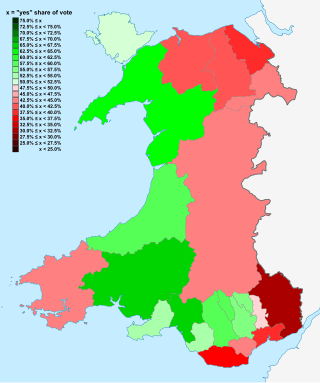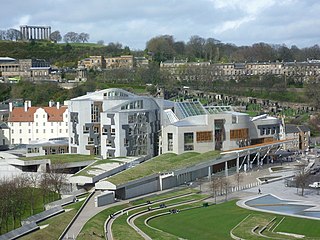The Declaration of Perth was a statement made by British Conservative Party leader Edward Heath on 18 May 1968, [1] at the party conference in Perth, Scotland, which committed the party to supporting some form of Scottish devolution. [2]
The Conservative Party in Scotland was traditionally a unionist party. In the late 1960s, support in Scotland for the pro-independence Scottish National Party was growing (seen spectacularly in Winnie Ewing's victory at the Hamilton by-election of 1967). In response the then Labour government set up the Kilbrandon Commission (1969–1973) to draw up its plans for devolution. Prior to Labour's initiative, at the Conservative Party Conference of 1968, held in Perth in Scotland, Edward Heath announced a party policy of support for devolution. Heath then formed a constitutional committee chaired by former Prime Minister Sir Alec Douglas-Home. In 1970, this committee produced "Scotland’s Government", a report that recommended the creation of a Scottish Assembly with 125 elected members and powers to initiate and discuss bills. However, the Bills were to require approval of the United Kingdom Parliament.
The 1970 General Election was won by the Conservative Party, and Heath became prime minister. However, the electoral weakness of the Nationalists removed the political pressure for devolution, which caused it to slip from the agenda. The two general elections of 1974 saw the return of a minority Labour Government and advances by the Nationalists (they won 7 seats in the February election and 11 in the October election). Labour was thus dependent on Nationalist support in Parliament, and hence, despite some opposition from within its own party, passed the Scotland Act 1978. This act provided for devolution, subject to approval by a referendum which took place in 1979.
In 1975, Edward Heath was replaced as Conservative leader by Margaret Thatcher. Under her leadership, the Conservatives gradually returned to a policy of opposing Scottish devolution. [3] However, former leader Alec Douglas-Home was still able to urge Scots to vote 'no' to Labour's proposal in 1979, with the promise that a Conservative government would offer a "better" bill.
When the referendum of 1979 failed to deliver the required mandate for devolution, the Nationalists withdrew their support for the Labour Government, resulting in a general election in 1979, which was won by the Conservatives. Despite being the only major party now opposing constitutional change and despite their reduced popularity and strength in Scotland, Conservative electoral victories in 1983, 1987 and 1992 ensured that no further legislative progress was made until the election of Labour under Tony Blair in 1997 led to a second devolution referendum.
Again the Conservatives opposed devolution in the 1997 debate (although Heath personally supported Labour's proposals [4] ), but this time their opposition was unsuccessful, and the Scottish Parliament was created by the Scotland Act 1998. Subsequent to its creation, the Conservative Party has indicated its acceptance of Scottish devolution as an irreversible political fact. [5]

The United Kingdom is a constitutional monarchy which, by legislation and convention, operates as a unitary parliamentary democracy. A hereditary monarch, currently King Charles III, serves as head of state while the Prime Minister of the United Kingdom, currently Sir Keir Starmer since 2024, serves as the elected head of government.

The West Lothian question, also known as the English question, is a political issue in the United Kingdom. It concerns the question of whether members of Parliament (MPs) from Northern Ireland, Scotland and Wales who sit in the House of Commons should be able to vote on matters that affect only England, while neither they nor MPs from England are able to vote on matters that have been devolved to the Northern Ireland Assembly, the Scottish Parliament and the Senedd. The term West Lothian question was coined by Enoch Powell MP in 1977 after Tam Dalyell, the Labour MP for the Scottish constituency of West Lothian, raised the matter repeatedly in House of Commons debates on devolution.

Scottish independence is the idea of Scotland regaining its independence and once again becoming a sovereign state, independent from the United Kingdom. The term Scottish independence refers to the political movement that is campaigning to bring it about.

The politics of Scotland operate within the constitution of the United Kingdom, of which Scotland is a country. Scotland is a democracy, being represented in both the Scottish Parliament and the Parliament of the United Kingdom since the Scotland Act 1998. Most executive power is exercised by the Scottish Government, led by the First Minister of Scotland, the head of government in a multi-party system. The judiciary of Scotland, dealing with Scots law, is independent of the legislature and the Scottish Government. Scots law is primarily determined by the Scottish Parliament. The Scottish Government shares some executive powers with the Scotland Office, a British government department led by the Secretary of State for Scotland.

The Scottish Assembly was a proposed legislature for Scotland that would have devolved a set list of powers from the Parliament of the United Kingdom. The Labour Government led the Scotland Act 1978 through Westminster which provided for the establishment of the Scottish Assembly.

The Scottish devolution referendum of 1997 was a pre-legislative referendum held in Scotland on 11 September 1997 over whether there was support for the creation of a Scottish Parliament with devolved powers, and whether the Parliament should have tax-varying powers. The result was "Yes–Yes": a majority voted in favour of both proposals, and the Parliament was established following an election in 1999. Turnout for the referendum was 60.4%.

The Welsh devolution referendum of 1997 was a pre-legislative referendum held in Wales on 18 September 1997 over whether there was support for the creation of a National Assembly for Wales, and therefore a degree of self-government. The referendum was a Labour manifesto commitment and was held in their first term after the 1997 election under the provisions of the Referendums Act 1997. This was the second referendum held in Wales over the question of devolution: the first referendum was held in 1979 and was defeated by a large majority.

The United Kingdom European Communities membership referendum, also known variously as the Referendum on the European Community (Common Market), the Common Market referendum and EEC membership referendum, took place under the provisions of the Referendum Act 1975 on 5 June 1975 in the United Kingdom to gauge support for the country's continued membership of the three European Communities (EC) – principally the European Economic Community (EEC, the 'Common Market'), the European Atomic Energy Community (Euratom), and the European Coal and Steel Community (ECSC). — which it had joined as a member state two-and-a-half years earlier on 1 January 1973 under the Conservative government of Edward Heath. The Labour Party's manifesto for the October 1974 general election had promised that the people would decide through the ballot box whether to remain in the EC.

A post-legislative referendum was held in Scotland in 1979 to decide whether there was a sufficient support for a Scottish Assembly proposed in the Scotland Act 1978 among the Scottish electorate. This was an act to create a devolved deliberative assembly for Scotland. A majority (51.6%) of voters supported the proposal, but an amendment to the Act stipulated that it would be repealed if less than 40% of the total electorate voted in favour. As there was a turnout of 64% the "Yes" vote represented only 32.9% of the registered electorate, and the act was subsequently repealed.
In Scotland, the Scottish National Party (SNP) is a left social democratic political party which campaigns for Scottish independence. The SNP has controlled Scotland's devolved legislature since the 2007 election as a minority government, and were a majority government from the 2011 election and have been a minority government, since the 2016 election.

Unionism in Scotland is a political movement which favours the continuation of the political union between Scotland and the other countries of the United Kingdom, and hence is opposed to Scottish independence. Scotland is one of four countries of the United Kingdom which has its own devolved government and Scottish Parliament, as well as representation in the UK Parliament. There are many strands of political Unionism in Scotland, some of which have ties to Unionism and Loyalism in Northern Ireland. The two main political parties in the UK — the Conservatives and Labour — both support Scotland remaining part of the UK.

The 1979 Welsh devolution referendum was a post-legislative referendum held on 1 March 1979 to decide whether there was sufficient support for a Welsh Assembly among the Welsh electorate. The referendum was held under the terms of the Wales Act 1978 drawn up to implement proposals made by the Kilbrandon Report published in 1973.

The Scottish Conservative & Unionist Party is part of the UK Conservative Party active in Scotland. It holds 5 of the 57 Scottish seats in the House of Commons, 31 of the 129 seats in the Scottish Parliament, and comprises 209 of Scotland's 1,227 local councilors.
A Cornish Assembly is a proposed devolved law-making assembly for Cornwall along the lines of the Scottish Parliament, the Senedd and the Northern Ireland Assembly in the United Kingdom.
The Royal Commission on the Constitution, also referred to as the Kilbrandon Commission or Kilbrandon Report, was a long-running royal commission set up by Harold Wilson's Labour government to examine the structures of the constitution of the United Kingdom and the British Islands and the government of its constituent countries, and to consider whether any changes should be made to those structures. It was started under Lord Crowther on 15 April 1969, Lord Kilbrandon took over in 1972, and it finally reported on 31 October 1973.

The Commission on Scottish Devolution, also referred to as the Calman Commission or the Scottish Parliament Commission or Review, was established by an opposition Labour Party motion passed by the Scottish Parliament on 6 December 2007, with the support of the Conservatives and Liberal Democrats. The governing Scottish National Party opposed the creation of the commission.

Devolution is the process in which the central British parliament grants administrative powers to the devolved Scottish Parliament. Prior to the advent of devolution, some had argued for a Scottish Parliament within the United Kingdom – while others have since advocated for complete independence. The people of Scotland first got the opportunity to vote in a referendum on proposals for devolution in 1979 and, although a majority of those voting voted 'Yes', the referendum legislation also required 40% of the electorate to vote 'Yes' for the plans to be enacted and this was not achieved. A second referendum opportunity in 1997, this time on a strong proposal, resulted in an overwhelming 'Yes' victory, leading to the Scotland Act 1998 being passed and the Scottish Parliament being established in 1999.

A vote of no confidence in the British Labour government of James Callaghan occurred on 28 March 1979. The vote was brought by the Official Opposition leader Margaret Thatcher and was lost by the Labour government by one vote, which was announced at 10:19 pm. The result mandated a general election that was won by Thatcher's Conservative Party. The last time an election had been forced by the House of Commons was in 1924, when Ramsay MacDonald, the first Labour prime minister, lost a vote of confidence. Labour politician Roy Hattersley later remarked that the vote marked "the last rites" of Old Labour. Labour did not return to government for another 18 years, with New Labour ideology. The BBC has referred to the vote as "one of the most dramatic nights in Westminster history".

In the United Kingdom, devolution is the Parliament of the United Kingdom's statutory granting of a greater level of self-government to the Scottish Parliament, the Senedd, the Northern Ireland Assembly and the London Assembly and to their associated executive bodies: the Scottish Government, the Welsh Government, the Northern Ireland Executive and in England, the Greater London Authority and combined authorities.

Unionism in Wales is the political view that supports a political union between Wales and the other countries of the United Kingdom. As well as the current state of the UK, unionism may also include support for Federalism in the United Kingdom and a United Kingdom Confederation.